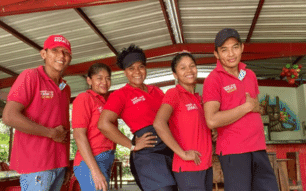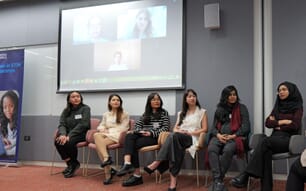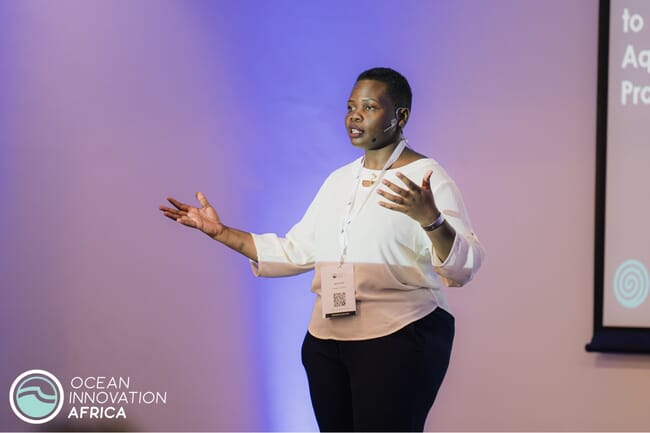
© Ocean Innovation Africa
What's your background and how did you get into the seafood sector?
I've been involved in agriculture for around seven years, starting as a farmer before working with smallholders across Africa. I came across BFA Global's TECA programme in 2022, focusing on the blue economy. During the programme, I connected with my co-founder Shamaine Mhondiwa, and AquaMnara was born.
How is AquaMnara’s business model structured, and how many farmers are currently engaged with your services?
We provide comprehensive support to fish farmers in Kenya across all stages of their operations. Presently, we collaborate with approximately 120 fish farmers, of whom around 25 are actively engaged.
Initially, our strategy involved direct sales of water quality monitoring devices to farmers. However, after piloting manual monitoring methods, we discovered that water quality monitoring wasn't a top priority for many farmers. This led us to integrate water quality monitoring into our broader service offerings.
Our approach encompasses facilitating access to high-quality inputs, offering expert advice, providing water monitoring, extension services, and facilitating market access.
Currently, we collaborate with Aquaculture Barn for fingerling supply and have signed an MoU with Dala Integrated Aquaculture, an integrated farm in Kisumu, to provide training and farming solutions. Additionally, we're in the final stages of partnership negotiations with leading fish feed companies in Kenya, aiming to ensure quality and reliability of feed for our farmers. To further streamline processes, we plan to create a platform listing certified suppliers of fingerlings and feed.
Moreover, we are considering buying fish from farmers to sell directly to consumers in Nairobi, expanding our business model to ensure comprehensive support for fish farmers and seamless market access.
Our upcoming water quality monitoring device, scheduled for launch this year, will offer valuable insights into farm performance. We've been invited by a confidential organisation to pilot the device on their farms, enabling us to gather valuable insights. To enhance accessibility, we are transitioning from selling the device to adopting a subscription model, allowing farmers to borrow the device and pay a monthly fee.
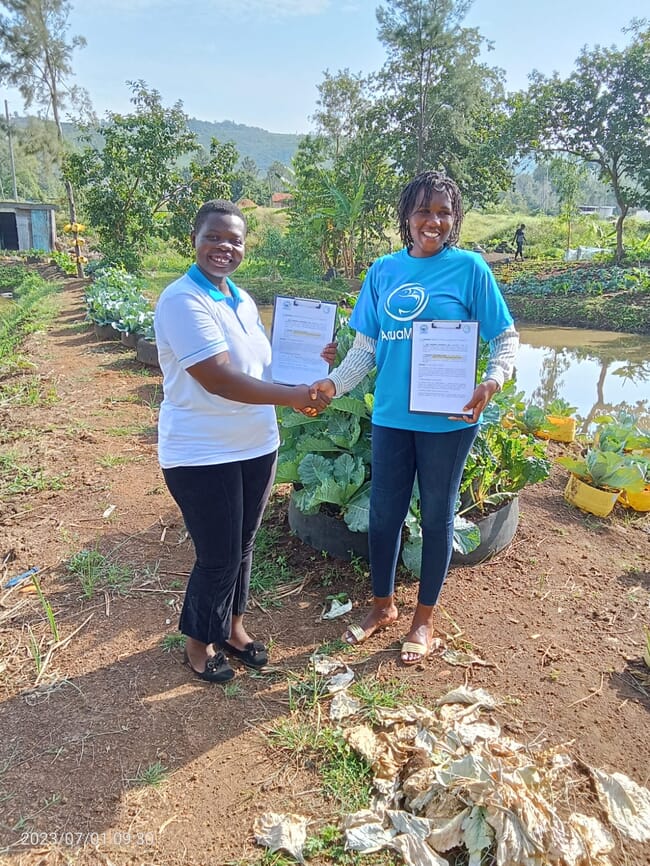
© AquaMnara
Why is monitoring water quality crucial in aquaculture, and how does your solution address this need?
Monitoring water quality is crucial due to the severe consequences poor conditions can have on fish health. Despite not being a priority for many farmers, we recognised its significance and integrated it with our other service offerings.
Initially, many farmers neglected water quality monitoring due to
perceived costs or lack of knowledge. Through our pilot programme, we discovered that the majority of farmers were not keeping records or implementing best management practices for water quality and
only paid attention to water quality when issues, such as fish deaths, arose.
This prompted us to conduct workshops to highlight the key parameters for assessing farm health. Recognising this gap, our focus shifted towards developing an IoT water quality monitoring device. Our solution not only enables farmers to track the health of their farms but also monitor the growth of their fish.
Can you share a success story from your work with farmers?
One success story involves Moureen Amolo, a female farmer who was the first client to subscribe to our pilot project. Moureen encountered difficulties with her fish not thriving and had concerns about water quality.
While she had access to both municipal water and spring water for her fish farming, she was using municipal water. Through our intervention, which included regular water quality monitoring, we identified low dissolved oxygen levels in the municipal water and recommended switching to spring water.
After this change, Moureen stocked 2,000 fingerlings and successfully harvested 1,800 fish, which was a record for her. This success story underscores the tangible impact of implementing proper water quality monitoring practices in aquaculture.
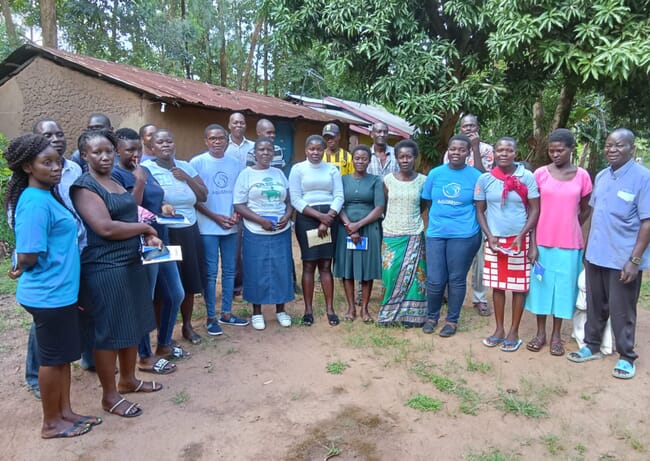
© AquaMnara
What has been your experience of starting and running your own business?
Engaging with fish farmers in rural villages has presented unique hurdles. Many farmers believed that starting fish farming would entail receiving everything they needed without any of their own financial investment. Consequently, during our training sessions, some expressed disappointment when they did not receive compensation for their time. This expectation seems to have been shaped by past experiences with institutions, where farmers received allowances and other benefits.
Despite these challenges, witnessing the progress and satisfaction of our partner farmers has been incredibly rewarding. We have learned the importance of clarity in our mission as a profit-driven company dedicated to empowering farmers and challenging institutional norms. Our ongoing task is to raise awareness of the business.
Do you face other major challenges?
When we introduced the concept of an IoT water quality monitoring device, farmers initially showed keen interest. However, now that we are offering it as a paid service, many hesitate to commit and invest in the service.
Regulatory hurdles also pose a considerable challenge, as regulations are not yet streamlined. This leads to varying practices among fish farmers, some operating with necessary licences while others do so without proper adherence.
Our biggest challenge has been establishing credibility with fish farmers. Initially, we did not plan to have our own farm, but we learned that farmers associate credibility with owning a farm. Consequently, we partnered with Dala Integrated Aquaculture to showcase our solutions.
However, our future plans include establishing our own farm to demonstrate different aquaculture technologies and provide hands-on training to farmers. We've been challenged to rethink our approach, with farmers requesting to visit our farm and even suggesting setting up our farm for specific training purposes.
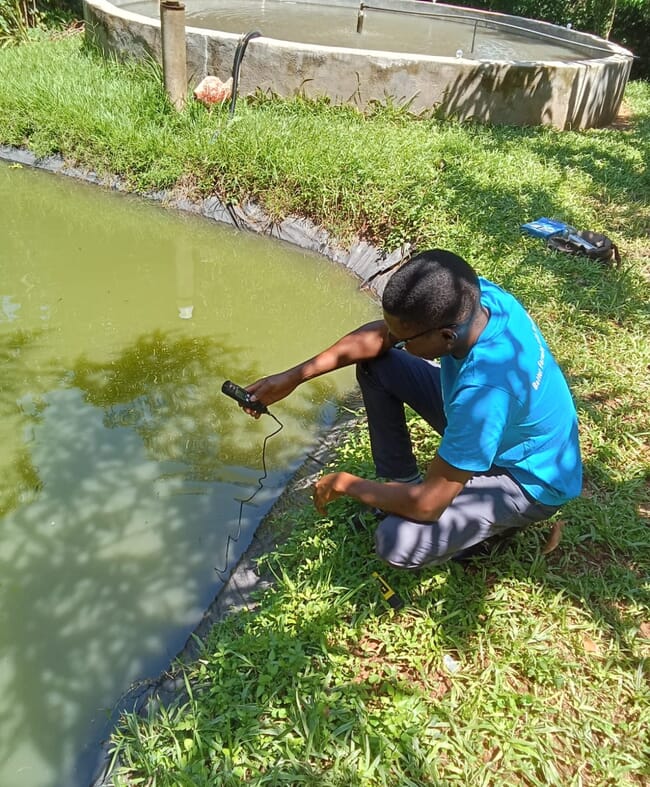
© AquaMnara
Have you encountered any gender-related challenges in the industry?
Many farmers and communities we engage with find it difficult to accept a woman in a leadership position, questioning my ability to run a company. Sometimes I had to tell them that I am an employee of AquaMnara rather than the co-founder. Despite these obstacles, I strive to be a voice for women in aquaculture, advocating for greater inclusion and recognition of our contributions.
What do you perceive as the biggest opportunities for growth and innovation in the aquaculture industry in Kenya?
The aquaculture industry is ripe for growth and innovation, particularly in technology adoption. Data transparency, traceability, and the use of technologies like AI and blockchain offer significant opportunities for innovation. Embracing these advances, along with exploring value-added products, will drive growth and create new opportunities, particularly for young entrepreneurs willing to embrace technology.
Are there any individuals or organisations in the sector that you find particularly inspirational?
Locally, figures like Dave [Okech] from Aquarech and Joseph [Rehman] from Victory Farms serve as benchmarks for success and motivate us to strive for excellence. Globally, pioneers like eFishery have revolutionised the aquaculture industry, attracting significant attention and investment.
Women leaders like Angela Odero, who empower others through initiatives like women's groups in aquaculture, are also sources of inspiration. And of course, your own contributions, Proscovia in raising awareness and sharing success stories in the sector are truly inspiring.
What is your vision for the future of AquaMnara?
Our vision is to simplify and make fish farming sustainable for farmers across Africa, empowering them to generate reliable income and create job opportunities. Success for us entails impacting over 400,000 fish farmers, providing them with the tools and resources needed to thrive in the industry.
We envision a future where fish farming becomes a cornerstone of economic growth and sustainability in Africa, contributing to food security and poverty alleviation. Ultimately, success for AquaMnara is synonymous with the positive transformation of lives and communities through aquaculture.


